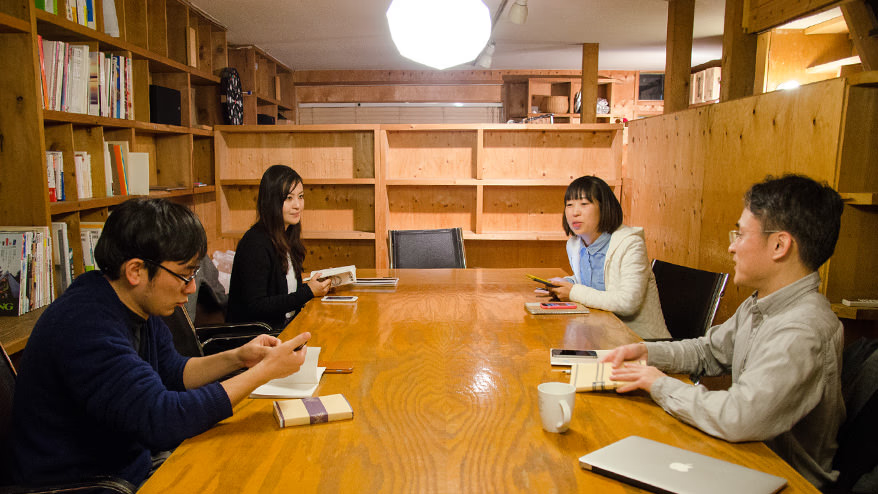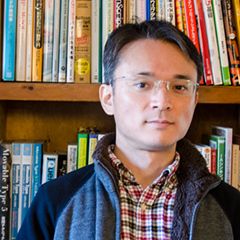モノサスには、登山部、フットサル部、梅酒づくり部など、メンバーが自発的にはじめた活動がいくつかあります。そのひとつに「読書会」があり、社内の図書委員である私(村上)が、みんなに参加を募って月に1度開催しています。
始めたきっかけは、「読書会やろうよ」というメンバーの菊永からの声でした。当時、図書委員は貸出しの管理以外、特に活動もなく、もう少し何かできないかと考え始めていた時期だったので、菊永の提案に賛同するかたちで読書会をスタートしました。
読書会の流れは、
「各自が本を持ってきて、はじめの40分間で読む(読みきれなくてもOK)」
「読んだ感想を、1人5分間でプレゼンテーションする」
というものです。
参加する目的は、「本を読む時間を確保したい」「プレゼンの練習をしたい」「普段接することのないメンバーと交流したい」など様々ですが、社内での読書習慣の普及につながればと思っています。
今回の参加者は、松原、村上、井上、君島、中庭の5名。
それでは読書会スタート!
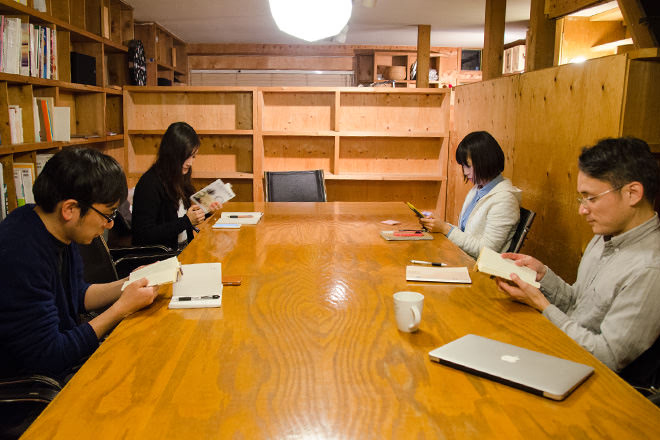
40分間、黙々と本を読み進めるメンバーたち
発表タイム
40分間の読書タイムを終えたら、ひとり5分間でその本を紹介します。
- グレッグ・マキューン 著『エッセンシャル思考』(紹介者:井上真理子)
- 渋沢栄一 著『論語と算盤』(紹介者:村上伊左夫)
- 草薙龍瞬 著『反応しない練習』(紹介者:松原恵)
- 戸部 良一 他 共著『失敗の本質』(紹介者:君島英樹)
- 落合陽一 著『魔法の世紀』(紹介者:中庭佳子)
グレッグ・マキューン 著『エッセンシャル思考 最少の時間で成果を最大にする』(紹介者:井上真理子)
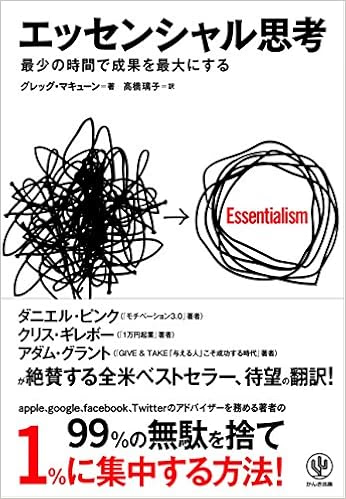
グレッグ・マキューン著、高橋 璃子翻訳『エッセンシャル思考 最少の時間で成果を最大にする』かんき出版 2014年 (Amazon)
井上 まだ読んでいる途中なんですが、「“より少なく、そしてより良く”を選択していこう」という考え方(=エッセンシャル思考)を紹介している本です。わが読書会の副リーダー?菊永さんが勧めてくれて、選びました。
「エッセンシャル思考」と対で「非エッセンシャル思考」があり、これは「どれも大事」「全部やらなくては」という考え方なんですが、これがまさに今の自分にピッタリ当てはまってしまいました。(表紙の絵を見ながら)まさにこのぐちゃぐちゃな状態ですね。
最近の自分を振り返ってみると、何をやってもうまくいかなかったり、無力感があふれてたり、何か解決したくても糸口が掴めないという状態だったんです。
エッセンシャル思考では、まず何が大事なのかを理解すること、そのためには大事じゃないものを捨てる決断もしなければいけない、というところに感銘を受けました。
本当にやるべきことに集中して取り組むことで、充実感を得ることが出来る。それが次の仕事へのエネルギーにもなるんだということを、この本で学びました。
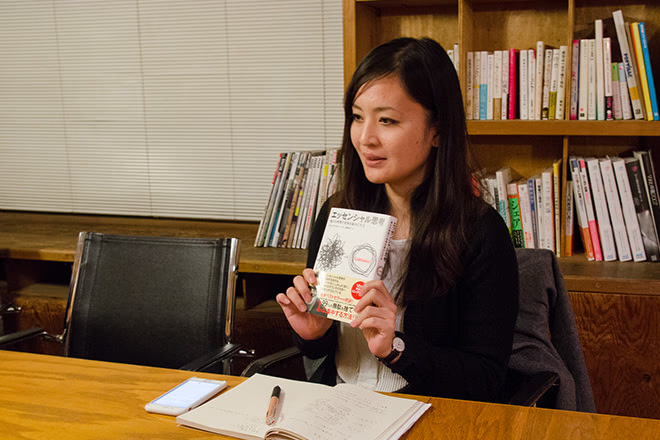
自分のことを照らし合わせながら本を読み解く井上真理子
松原 何が大切で何を捨てるのかの判断基準って、どんな風に書いてあるんですか?
井上 例として、クローゼットを自分の頭のなかと置き換えてるんですけど、いつか着るだろうなっていう洋服を貯めこんでいくと、クローゼットの中ってパンパンになりますよね。それを、自分の中でこれだけは大事にしたい、すごく似合ってる、というものは取っておいて、いつか着るけど、今は着ないな、というのを取り除く。自分の中で「これだけは」っていうのを持っていればよくて、あとは全部捨てていい、という。
松原 特別なものだけを取っておく。
井上 心に引っかかるものを残す。迷ったら捨てる。BetterよりBestを選ぶ、ってことですね。
渋沢栄一 著『論語と算盤』(紹介者:村上伊左夫)
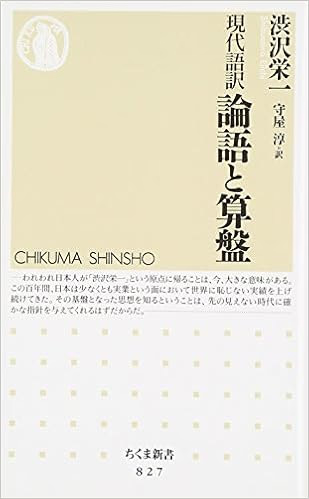
渋沢栄一著、守屋淳翻訳『現代語訳 論語と算盤』筑摩書房 2014年(Amazon)
村上 これは、近代日本を設計したひとりと言われる渋沢栄一の講演をまとめた本です。
本文の一節に「自分の仕事に趣味を持て」という箇所があるんですが、言われたことをやるだけの型にはまった仕事ではなく、「趣味」をもって取り組むことで心の通った仕事ができる、と。
私の所属するチェックチームの仕事も基本的に同じことの繰り返しですが、ただ渡された仕事をこなすだけではなく、Webに対する自分なりの理想像とか、何らかの面白みとかをもって取り組むことで、一歩進んだ仕事ができると思います。
さらにこの本では「人としての趣味を持ってほしい」と踏み込んでいて、果たして自分自身はどうだろうか、ということも考えました。
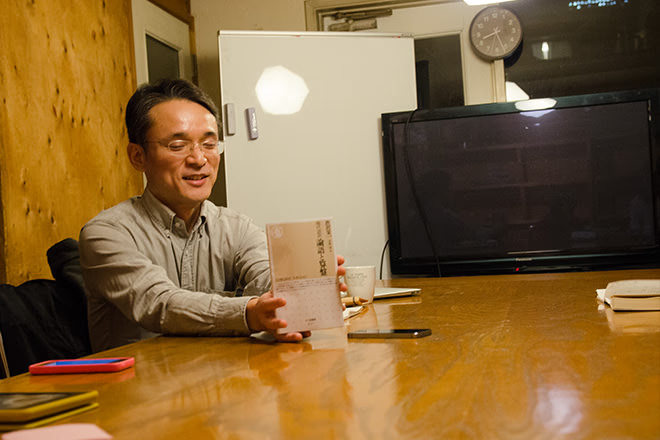
読書会の主催者で、図書委員長の村上伊左夫
中庭 論語と経済って、関係が深いんですか?
村上 いえ、普通は関係ないと思うんですよ。ただ、経済活動にも、論語の理論を組み込めば欲望が暴走しないように歯止めをかけられると、渋沢栄一という人は考えたんですね。
論語を書いた孔子も、経済活動を否定してるわけじゃなくて、正しい方法で富を手に入れるのであれば、それは積極的にやりなさいと言っているそうです。
これまでの自分の認識とちがったんで、へええって感じでした。
君島 渋沢栄一って帝国ホテルとか作った人ですよね。
村上 あ、そうですそうです。最初の方にも書いてあるんですけど、明治時代に起業した400社くらいの会社に関係してるとか。まさに近代日本を設計した人ですよね。
草薙龍瞬 著『反応しない練習』(紹介者:松原恵)
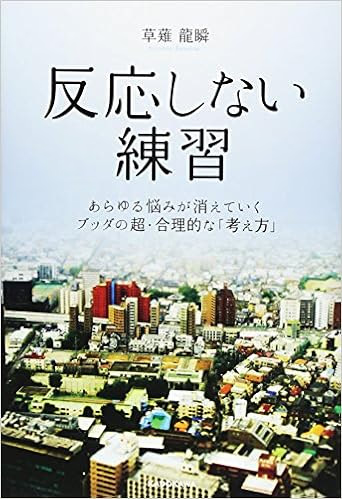
草薙龍瞬 著『反応しない練習 あらゆる悩みが消えていくブッダの超・合理的な「考え方」』KADOKAWA/中経出版 2015年 (Amazon)
松原 「アンガーマネージメント」って皆さんご存じですか? 怒りをコントロールしてハッピーになろう、という考え方です。ポイントの1つに「怒りのピークの6秒を過ぎるまでは反応しない」というものがあるんですが、とは言え、反応しないようにするにはどうしたらいいのか。
この本では「怒りに限らず私たちの日常は全て心の反応」であり、「無駄に反応しなければ全ての悩み苦しみから開放される」ということを、ブッタの教えなどと照らしあわせて考えていこう、と書かれています。
読んでなるほどと思ったのは、「心の反応は、まず"求める心"があり、七つの欲求を生み出し、それに突き動かされて人が反応する。快楽が得られれば嬉しく、思いどおりにならないと不満になる」という部分です。
喜んだり怒ったりする人を見たとき、「なんでだろう」と思うことがよくありますが、相手の心の中でこのような出来事が起こっているんだなと思うと、冷静に見ることができます。
これは自分自身にも同じことが言えるので、「なんとなくそう感じる」のではなく、今自分の中でどんな心の反応が起こっているのか観察することを、日頃から心がけていきたいと思いました。
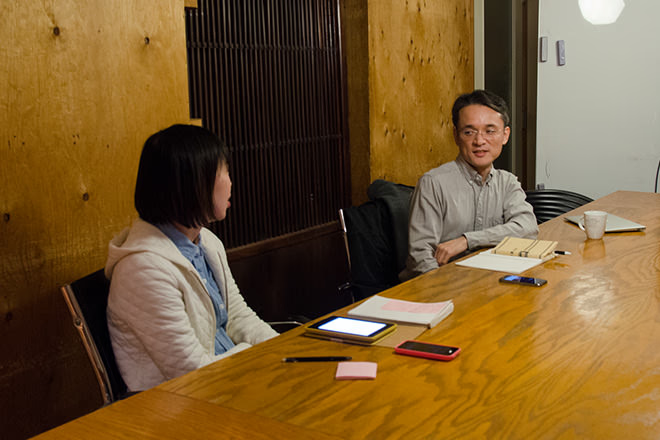
質問する村上(右)とそれに答える松原(左)
村上 私の場合は、「いま自分が怒っている」ということ自体に、自覚がないというか、気づいていないことも多いんですが、そういう場合のアドバイスって何か書いてありましたか?
松原 無意識で怒ってしまう?
村上 後から思い返してみて「あのとき自分は怒ってたのかな~」とか。
松原 基本的には、怒っているという自覚があって、その後の対応についてアドバイスしている本なので、まずは自分の反応に気づくことが第一歩かもしれないですね。
戸部 良一 他 共著『失敗の本質』(紹介者:君島英樹)
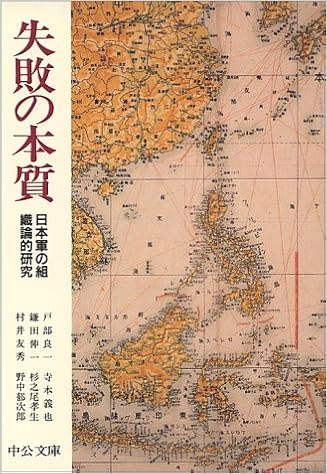
戸部 良一 他 共著『失敗の本質』中央公論社 1991年(Amazon)
君島 仕事や日常生活を送る上で、同じミスをすることってありますよね。またこのパターンか〜って。表面的じゃなくて根本から問題解決したいと思っていたときに、当時の職場の上司に勧められたのがこの本です。実は、数行読んだまま2年ほど放置していたんですが、今回改めて読んでみようと、ページをめくってみました。
第二次世界大戦の沖縄戦やレイテ沖海戦、ノモンハン事件などを通じて、なぜ敗戦をむかえてしまったのか。その要因などを分析して、そこから演繹的に仕事や日常生活に活かしていこう!そんな読み方をする紳士淑女が多いらしいです。
ですが、軍事的な専門用語も多く、僕にはうまく咀嚼する事ができませんでした。内容をしっかり理解するには、今後2回、3回と読み直す必要があると思います。そのことがわかっただけでも、儲けモノでした。
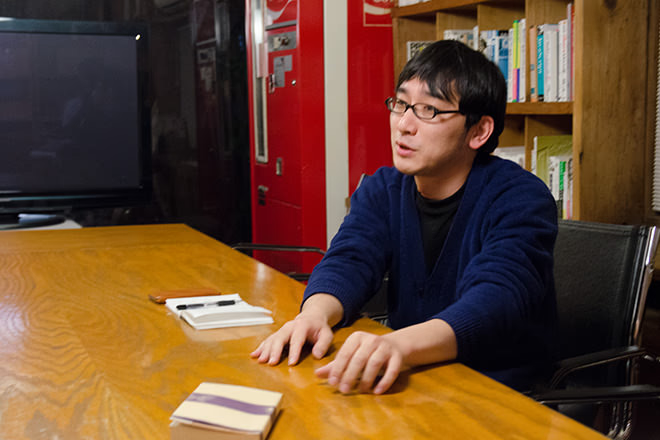
読書会初参加の君島英樹
中庭 戦争の体験談などが書かれているんですか?
君島 どちらかというと、具体的な戦略としてどうこう、というのが多いですね、ちょっと、抽象的で噛み砕けませんでしたが。
村上 かなり渋い(?!)本を薦められたんですね…
君島 ちょっと僕には早かったですね~
落合陽一 著『魔法の世紀』(紹介者:中庭佳子)
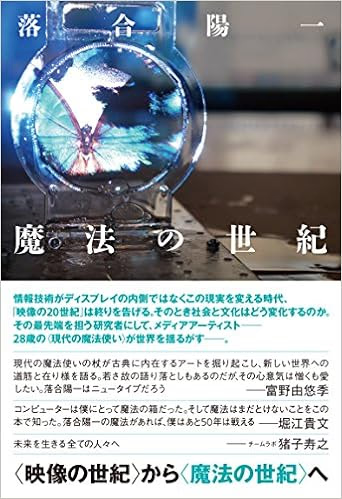
落合陽一 著『魔法の世紀』 PLANETS 2015年(Amazon)
中庭 この本は、私の購読しているメルマガで連載されていました。それがかなり面白くて...。
新しい世界の見方をする若者が現れたぞ!って感じでワクワクしました。
著者の落合陽一は、まだ20代のメディアアーティストで、東京大学を飛び級で博士号をとり、現在は筑波大学助教授でデジタルネイチャー研究者でもあります。
この中で、彼はふたつのことを飛び越えようとしています。
ひとつは「技術」と「表現」の境界線。もう一つは「自然」と「人工物」の境界線です。
「技術」と「表現」の境界線を飛び越える能力の比喩として、彼は「魔法」という言葉を使っています。そもそも「魔法」ってなんなの?怪しいよねって思うかもしれませんが(笑)、ここで言う魔法とは、呪文のような「プログラムコード」によって、私たちが生きている物理世界に干渉することだと言います。それは技術と表現(芸術)が融合したArtであり、その意味で、メディアアーティストである自分のことを「魔法使い」と呼んでいます。
もうひとつの「自然」と「人工物」の境界線ですが、たとえば「CDの音なんてダメ、リアルの音じゃないと」と言うアンチコンピューターみたいな人がいるとします。それに対して「いや、それって音の解像度の問題でしかないですよ」と返すのが落合さん流です。
CDは人間が聞き取れる音を再現するメディアにすぎない、リアルの音の解像度を再現できるメディアが作れたら、それで解決するんじゃないかと。「自然」と「人工物」の境界線自体が、彼にはナンセンスなんです。
あと面白いのは、彼は「映像の世紀は終わる」と言ってます。
これまでは映画など、ディスプレイの中で完結する、文脈を楽しむメディアが中心でした。でも彼は、文脈的な消費って飽和状態だし、ディスプレイとかダサいよね、って感じなんです(笑)。
次にくる「魔法の世紀」は、ディスプレイの枠を超え、現実世界まるごとメディアにしてしまうような時代で、文脈主義よりも「魔法」的な表現を体験するメディアが台頭してくる。落合さんはそれらを「心を動かす計算機」と言います。(ここで5分終了のアナウンス)あ、終わっちゃった。
君島 僕もそれ読みましたよ。
中庭 本当ですか?うまく説明できたか心配です(笑)。
村上 ここでいうメディアって何なんですか?
中庭 ありとあらゆるもの、です。古代壁画もあるし、庭園なども含まれます。過去のアート作品、Webのメディアもそうです。紙もメディアですしね。この本はそういったメディアの変遷、歴史の話もしてるんです。まだまだ話し足りませんね(笑)。
読書会を終えて
本を片手にあつまり、ひとつのテーブルを囲んで40分間本を読む。そして語り合う。
そんな時間を共有する場が、モノサスの「読書会」です。
人に紹介されることで思いがけない本に出会うこと。また、本を選んだ背景にその人が抱える悩みや思いが垣間見えるのも、読書会の魅力のひとつではないでしょうか。
初参加のメンバーも加わり、いつもと違うジャンルの本も紹介されるなど、今回も楽しいひとときになりました。
それではまた来月。
